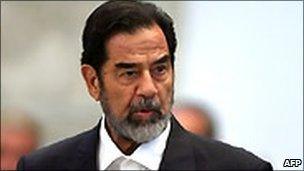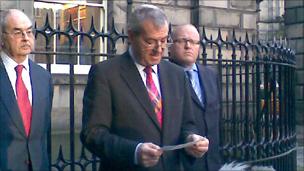Weir Group fined £3m over Saddam sanctions breaches
- Published

Weir apologised over its illegal dealing with Saddam's regime
One of Scotland's largest companies has been fined £3m for breaching UN sanctions on Iraq by doing business with Saddam Hussein's regime.
Glasgow-based engineering firm Weir Group admitted paying kickbacks to the dictator's government a decade ago to secure lucrative business contracts.
The High Court in Edinburgh heard this had contravened the Oil For Food programme aimed at helping Iraqis.
Judge Lord Carloway also confiscated £13.9m of illegal profits from Weir.
The court was told that Weir Group Plc admitted two charges of breaching United Nations sanctions, imposed on Iraq before the 2003 invasion.
Charges centred on contracts entered into under the Oil For Food programme between 2000 and 2002.
The programme was introduced by the UN to enable exports of Iraqi oil to take place, provided the cash was used for food, medicine and other humanitarian needs.
The engineering group made payments to the tune of £3.1m to the dictatorship through an agent in order to secure contracts worth about £35m.
The court heard the agent was also paid "substantial" sums of money for his services, amounting to £1.4m.
On Tuesday, an apology on behalf of the directors of Weir Group was read out in court.
In his judgement, external, Lord Carloway said it was appropriate that the firm should face "a substantial financial penalty" for busting UN sanctions and to "deter future offences".
He said he had taken into account "a number of mitigatory factors" such as Weir's acceptance that it had to repay illegal profits of almost £14m and "the remorse shown at current group board level in relation to their betrayal of the confidence of the company, its shareholders and the general public".
The judge said that had it not been for Weir's early guilty plea, he would have imposed a fine of £4.5m.
Speaking outside court, Weir Group chairman Lord Smith said the company had been "transformed" since the time of the offences.
He said: "What happened back in 2001 was wrong and we accept full responsibility. Today's decision finally draws a line under the Crown Office's Oil For Food investigation, which we believe is in the best interests of shareholders.

Lord Smith said it was a priority that the firm now operates with integrity
"Since 2001, Weir has been transformed. We have a different board and we have a different management team, all of whom are committed to doing business at all times in an ethical manner.
"Today, we have in place robust ethical policies and procedures and we operate a zero-tolerance approach to any behaviour that contravenes them.
"The board regards it as an absolute priority ensuring that we operate with integrity. I am personally confident that we have in place the right culture with the necessary policies and procedures to ensure that it does."
The confiscation order for £13.9m of the firm's illegal profits, made under proceeds of crime legislation, is the biggest ever made by a Scottish court.
George Hamilton, Assistant Chief Constable of Strathclyde Police, said the case against Weir had been built from "a long running and complex investigation".
"Our officers had to sift through a large volume of information and undertake interviews and recover evidence from across the UK and a number of other jurisdictions around the world," he said.
"Inquiries such as this present investigative and logistical challenges but in the face of this the police, Crown and Serious Fraud Office teams working on the case were determined to establish the facts.
"I am pleased to see the successful conclusion of those efforts in today's ruling by the court."
'Overseas projects'
Assistant Chief Constable Hamilton added: "Just because this case involves a large company does not mean that they are above the law.
"I sincerely hope that today's result serves as a warning to other companies who may be tempted to think that they can break the law and get away with it."
Justice Secretary Kenny MacAskill said the confiscation order made against Weir sent out a clear message that "illegal activity by Scottish firms" would not be tolerated "here or abroad".
He said: "I am pleased to see that the Weir Group accepted its conduct was wrong and agreed to pay a penalty of £13.9m that will now be put to good use through our successful cashback for communities programme.
"I am also delighted to confirm that a significant sum will be given over to support the Scottish government's international development work, and discussions will now begin about how this money can be best used to help projects overseas."
- Published14 December 2010
- Published24 November 2010
- Published18 November 2010
- Published17 September 2010
- Published14 June 2010
- Published27 May 2010